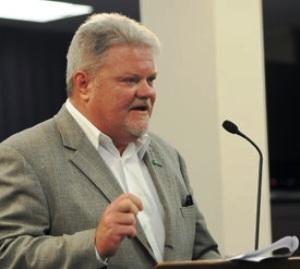Marijuana reform is accelerated in the United States. What lessons can we learn from the Dutch experience? A new report has some ideas.
From the big picture of the origins and state of marijuana prohibition in America to the close-up portrait of one of the country's most pot-friendly and -dependent local economies, Doug Fine delivers with "Too Big to Fail."
If you have an interest in American history and how we got to where we are with the war on drugs, you need to read Smuggler Nation. You'll be glad you did.
Now more than ever, StoptheDrugWar.org needs your financial support to continue to provide this crucial informational tool that builds and empowers the movement. We have a special new offer for those donating $50 or more, which this post provides some updated information about.
New Hampshire Gov. Maggie Hassan has signed the medical marijuana bill into law. All of New England is now medical marijuana territory.
New Hampshire becomes the 19th medical marijuana state, some folks in Kentucky would like it to become one, too; and the local tussling continues in California. And in late news, the DEA strikes in Washington State.
A new federal bill would heighten penalties for "trespass grows" of marijuana on public or private land if they cause environmental damage. Or, we could just legalize it.
The International Drug Policy Reform Conference is a biennial event that brings together people from around the world who believe that the war on drugs is doing more harm than good.
An Oklahoma prosecutor's scheme to let a private security contractor profit from highway drug stop asset seizures has come unravelled amidst charges of "policing for profit" and "policing for private profit."
Kentucky state Sen. Perry Clark will introduce his medical marijuana bill for the third time in January, but there is a hearing in August, and Clark and supporters are bringing the noise.
A Baltimore man is dead after police pulled over the vehicle in which he was riding on suspicion of drug possession and a struggle ensued.
Four of the seven law enforcement personnel making our hall of shame this week were women. You've come a long way, ladies!
Interns are making an important difference fighting the good fight with us at StoptheDrugWar.org.
The US states of Colorado and Washington voted last year to legalize marijuana and are moving forward toward implementing legalization. Activists in several states are lining up to try to do the same next year, and an even bigger push will happen in 2016. With public opinion polls now consistently showing support for pot legalization at or above 50%, it appears that nearly a century of marijuana prohibition in the US is coming to an end.

A coffee shop in Amsterdam, where clients can sit and smoke. Why no on-premises consumption here? (wikimedia.org)
Exactly how it comes to an end and what will replace it are increasingly important questions as we move from dreaming of legalization to actually making it happen. The Netherlands, which for decades now has allowed open marijuana consumption and sales at its famous coffee shops, provides some salutary lessons -- if reformers, state officials, and politicians are willing to heed them.
To be clear, the Dutch have not legalized marijuana. The marijuana laws remain on the books, but are essentially overridden by the Dutch policy of "pragmatic tolerance," at least as far as possession and regulated sales are concerned. Cultivation is a different matter, and that has proven the Achilles Heel of Dutch pot policy. Holland's failure to allow for a system of legal supply for the coffee shops leaves shop owners to deal with illegal marijuana suppliers -- the "backdoor problem" -- and leaves the system open to charges it is facilitating criminality by buying product from criminal syndicates.
Still, even though the Dutch system is not legalization de jure and does not create a complete legal system of marijuana commerce, reformers and policymakers here can build on the lessons of the Dutch experience as we move toward making legal marijuana work in the US.
"Governments are looking to reform their drug policies in order to maximize resources, promote health and security while protecting people from damaging and unwarranted arrests," said Kasia Malinowska-Sempruch, Director of the Open Society Global Drug Policy Program. "The Netherlands has been a leader in this respect. As other countries and local jurisdictions consider reforming their laws, it's possible that the Netherlands' past offers a guide for the future."
A new report from the Open Society Global Drug Policy Program lays out what Dutch policymakers have done and how they have fared. Authored by social scientists Jean-Paul Grund and Joost Breeksema of the Addiction Research Center in Utrecht, the report, Coffee Shops and Compromise: Separated Illicit Drug Markets in the Netherlands tells the history of the Dutch approach and describes the ongoing success of the country's drug policy.
This includes the separation of the more prevalent marijuana market from hard drug dealers. In the Netherlands, only 14% of cannabis users say they can get other drugs from their sources for cannabis. By contrast in Sweden, for example, 52% of cannabis users report that other drugs are available from cannabis dealers. That separation of hard and soft drug markets has limited Dutch exposure to drugs like heroin and crack cocaine and led to Holland having the lowest number of problem drug users in the European Union, the report found.
Pragmatic Dutch drug policies have not been limited to marijuana. The Netherlands has been a pioneer in harm reduction measures, such as needle exchanges and safe consumption sites, has made drug treatment easy to access, and has decriminalized the possession of small quantities of all drugs. As a result, in addition to having the lowest number of problem drug users, Holland has virtually wiped out new HIV infections among injection drug users. And, because of decriminalization, Dutch citizens have been spared the burden of criminal records for low-level, nonviolent offenses.
The Dutch have, for example, virtually eliminated marijuana possession arrests. According to figures cited in the report, in a typical recent year, Dutch police arrested people for pot at a rate of 19 per 100,0000, while rates in the US and other European countries were 10 times that or more.
For veteran drug reform activist Joep Oomen of the European NGO Coalition for Just and Effective Drug Policies (ENCOD), the report is welcome but not exactly "stop the presses" news.
"The conclusions of this report have been known for a long time," he told the Chronicle. "Already by the end of the 1990s, when European governments had to acknowledge that Dutch drug policies had proven more effective in reducing risks and harms than many other countries, the criticism that had been expressed earlier by mainly German and French heads of state was silenced. For instance, in the Netherlands the age of first heroin use is the highest of Europe, which is explained by the relative tolerance concerning cannabis use." [Ed: A high age of first use is considered good, because it means that fewer people are experimenting with a drug when they are young -- which in turn means fewer people ever trying it, and those who do being more likely to be capable of avoiding problematic use.]
While the Dutch can point to solid indications of success with their pragmatic drug policies, it is not all rosy skies. The "back door problem" alluded to above continues unresolved, and the relative laxness of Dutch marijuana policy has led to an influx of "drug tourists," especially from neighboring countries, such as France and Germany. Both of those irritants have provided fodder for conservative parties and administrations that have sought to roll back the reforms.
"There seems to be more admiration for Dutch drug policy outside the Netherlands than inside," Oomen observed. "Right-wing governments that have dominated the Dutch political climate since 2002 have slowly dismantled acceptance-oriented drug policy. Lately the establishment of the Weedpass in the southern part of the country [which excludes non-Dutch from access to the coffee shops] and new measures against grow shops and coffee shops are definitely threatening to undermine the coffee shop model," he said.
"Instead of completing the regulation of this model by solving the coffee shops' back door problem, the government seems to apply a policy of slow elimination by making the conditions worse in which the shops have to operate," Oomen continued. "And the Dutch press follows blindly, often referring to coffee shops as a link in a criminal chain, which is unavoidable since the ban on cultivation forces shop owners to deal with criminals, but without questioning the measures that reinforce the criminal aspect."
While the national government may now be hostile to pragmatic marijuana policies, it is facing considerable resistance from elected officials. The Weedpass program now appears to be largely a dead letter, thanks to opposition from the likes of Amsterdam Mayor Eberhard van der Laan, and other local elected officials are moving to address the back door problem.
"Several Dutch mayors have plans for municipal cannabis farms to supply the coffee shops and take crime out of the industry," said Grund, research director at the Addiction Research Center. "But if Dutch drug policy offers one lesson to foreign policymakers, it is that change should be comprehensive, regulating sale to consumers, wholesale supply and cultivation."
Grund is watching the American experience with legalization in Colorado and Washington and had some observations he shared with the Chronicle.
"As far as I can judge," he said, "these are both pretty solid proposals, although quite different in detail and approach -- e.g., a vertically integrated chain of supply in Colorado and separate licensing for producers, processors, and retailer in Washington. Clearly in both states legislators have done their best. Interesting then, that they end up with rather different plans, which is actually fine, as it provides us with the opportunity to evaluate different models. For more than 25 years, there was just about only the Dutch experience with cannabis decriminalization and coffee shops; now we see different models of cannabis reform and distribution being implemented across continents. Comparing these experiences as they evolve should allow us to develop more effective drug policies."
Policymakers and regulators should try to avoid rigidity and be ready to deal with unintended responses and consequences, the Dutch social scientist said.
"The point is to approach these flexibly and pragmatically; adjust when necessary, while keeping your eyes on the ball: cutting the link between cannabis on the one hand, and criminal records, mafia and more, on the other," Grund advised, noting that the 1976 Dutch law separating hard and soft drugs did not anticipate the arrival of the coffee shop phenomenon. "As Dr. Eddy Engelsman, former chief drug policy maker at the ministry of health -- and known as the architect of Dutch drug policy -- said when we interviewed him, 'coffee shops just emerged.' The policymakers deemed that these fit their overall policy objectives and allowed for them to ply their trade openly," he recalled.
Grund also weighed in on personal cultivation -- Colorado allows it; Washington does not -- and public use, which it appears will remain forbidden in both states.
"I think Washington presents more of a business and revenue raising strategy, while Colorado feels more like grassroots meets civil libertarian meets amenable regulator," he opined. "The more social, homegrown orientation of the Colorado proposal – allowing for home growing, bartering between friends -- could perhaps engender a less market driven distribution structure, where friends compete in growing the most pleasant marijuana, not the most profitable. Something like the Spanish cannabis clubs," he suggested.
Public, convivial pot smoking in designated areas should be allowed, Grund said, because it has benefits.
"Dedicated places of consumption -- such as the coffee shops in the Netherlands or shisha parlors -- offer an opportunity to promote responsible behavior around cannabis consumption," he argued. "Smoking cannabis in a safe, hospitable and stress free environment engenders different use patterns from quickly getting high in a service ally behind a bar or in a car parked in a quiet place. Coffee shops offer a moderating environment where self regulation is supported by social learning and control."
While Grund was looking forward to the future in the US, Oomen was thinking of the unfinished business in the Netherlands, but his musing also provide food for thought for American reformers, especially those contemplating decriminalization measures.
"The lesson here is that decriminalization or depenalization are useful concepts for a transition period, but real progress can only be obtained and assured with legal regulation of the entire chain from producer to consumer," the ENCOD leader noted. "The Dutch case shows that politicians will always use the smallest margin they have to maintain to a repressive model, provoking criminal activities which they can use to justify their policies publically. This is the drug policy perpetual motion machine."
Colorado and Washington are already well down their particular paths to marijuana legalization. But there is still time for the next wave of legalization states to learn and apply those lessons, not just from Denver and Olympia, but from the Dutch pioneers as well.
back to top
Doug Fine, Too High to Fail: Cannabis and the New Green Economic Revolution (2012, Gotham Books, 319 pp., $28.00 HB)
[Ed: This review was based on the hardcover edition of "Too High to Fail." The paperback edition of Too High Fail has now been published as well. According to the author it includes a a postscript that reflects "more unbelievable happenings in Mendocino County and worldwide through the beginning of this year."]
Marijuana and marijuana policy are big news these days -- they are exciting times, indeed! -- and that's reflected in what has now become a deluge of books on the topic. We've probably reviewed a dozen or more pot books in the last year alone, and here's another one. While, given the torrent of titles, it becomes increasingly difficult to stand out in the crowd,
New York Times bestselling author Doug Fine's
Too High to Fail is exceptional.
Fine writes with verve and passion, making it clear from the outset that he views marijuana prohibition as not only useless, but harmful -- not only to any sense of justice and morality, not only to the millions of people arrested and punished in myriad ways for the crime of possessing or trading in a hugely useful and versatile plant, but also to the country's efforts to claw its way back from the precipice of the Great Recession.
With that out of the way, in early 2011, Fine heads off for Mendocino County, California, ground zero in the new marijuana economy. A couple of hours north of San Francisco on US 101, Mendocino is part of the state's famous marijuana-growing Emerald Triangle, and is, to a mind-blogging extent, dependent on the pot economy. In fact, if not for pot, Mendocino would probably wither up and blow away. The logging industry is history, and the legal agricultural economy is a fraction of the size of the pot economy. (The county's largest legitimate ag crop, wine grapes, pulled in about $75 million in one recent year, at the same time the pot harvest was estimated at $8.1 billion, or about a hundred times as much).
The pot economy is normalized in Mendocino County. Marijuana dollars pay for everything from the new pickup trucks flying off dealers' lots every fall to the capital necessary to open boutique businesses that dot one-horse towns like Willits and Ukiah to the salaries of Mendocino County sheriff's deputies (at least for a couple of years; see below). County officials know what the local economy runs on, and so does the sheriff, which is why the county instituted its zip-tie program for growers willing to register as medical marijuana providers. Farmers paid thousands of dollars into county coffers for those zip-ties, which would let state and local law enforcement know that these were legal grows, not outlaw ones.
If California, where medical marijuana is legal is Fine's "bubble," Mendocino County, with its casual acceptance of the pot economy is the bubble squared, and growers operating within the guidelines of the zip-tie program, complete with inspections by law enforcement are inside the bubble cubed. This is where Fine situates himself, as he uses the journey of a single plant from cloning to delivery to a patient as the hook for his narrative of his hazy Mendo days.
Fine's sympathetic portraits of the folks involved, from Sheriff Tom Allman, who told him he wouldn't get "up off my ass" to arrest a guy with a pound of pot in the sheriff's parking lot and who created the zip-tie program, to Deputy Randy Johnson, who performed the unique job of zip-tie program compliance sergeant, to novice Mendo outdoor (but experienced East Bay indoor) grower Tom Balogh, who grew the clone Fine tracked, to Northstone Organics head Matt Cohen, who was determined to run a farmer-to-patient collective in scrupulous compliance with state laws, help put a human face on Mendocino's marijuana culture and some of its intricacies.
Fine also shines at explicating the various currents and tensions that run through the community, whether it's the veteran "Redneck Hippies" unhappy with the new generation of young, bling-slinging profiteers or county commissioners not exactly happy with Mendo's free-wheeling grow scene, but who recognize that it can't be wished away and should instead be regulated for the benefit of the county and its citizens. Or the travails of newcomer Balogh, who must contend with skeptical neighbors and prove to the community that he's not just another hit-and-run wannabe "sensimillionaire."
But while Fine spent a season deep inside the bubble, he also found that it could be punctured. He details his own experience being pulled over by sheriff's deputies in neighboring Sonoma County to the south who profiled him for his facial hair and muddied, big-tired pick-up, as well as the misadventures of two Northstone Organics deliverymen also pulled over and busted by Sonoma narcs and, gallingly, prosecuted by Sonoma County district attorneys. The drive from Mendo south through Sonoma and on to the Bay Area was called "running the gauntlet," as law enforcers on the hunt for busts and assets to seize preyed on the US 101 traffic less like highway patrolmen than highwaymen.
(As a resident of medical marijuana-friendly Sonoma County, such behavior by my elected officials and their minions offends my sensibilities. I'll be attending a Summer Solstice event this coming week to celebrate the formation of a political action committee whose goal is help enlighten our public servants, or replace them if they appear too thick-headed to get it.)
But Fine, Northstone Organics, and the entire Mendocino County effort to craft a tightly-regulated, county-benefiting medical marijuana program encountered an even more dramatic bursting of the bubble when federal prosecutors renewed their war on medical marijuana in the fall of 2011. Mendonesians had largely ignored the raids on dispensaries going on elsewhere in the state as the war ramped up, but they couldn't ignore the crew of DEA agents who rousted Cohen at gunpoint and chopped down Northstone's 99 plants, depriving more than 1,700 patients of their medicine, and effectively putting an end to the innovative zip-tie program.
With Too High to Fail, Fine show us how marijuana can be regulated and integrated into the community. And he dares to dream of a future where the cannabis plant, with all its manifold uses, can be integrated into, and indeed, become a boon for, the American economy. He also shows us the obstacles in the way.
The story of Mendocino's (and America's) marijuana adventure didn't stop in the fall of 2011. Since then, even as the first two states legalized marijuana outright at the ballot box, the federal offensive against medical marijuana in California has continued. Mendocino County had to fend off an overreaching federal subpoena of all records related to its medical marijuana program, Northstone has been knocked out of business, and an innovative program that served the interests of the community and the local economy has been stopped in its tracks.
In the new paperback edition, Fine returns to Mendocino and adds a 6,000 postscript on all the exciting developments since 2011, including legalization in Colorado and Washington, the seismic shifts in public opinion in favor of legalization, and the continuing trials, tribulations, and triumphs of the county's growers and the public officials attempting to come to grips with it all.
Although Fine looks bravely and boldly toward a cannabized future, we aren't there yet. But Too High to Fail chronicles what it could look like based on the Mendo experience, and provides a valuable and entertaining read along the way.
back to top
Smuggler Nation: How Illicit Trade Made America, by Peter Andreas (2013, Oxford University Press, 454 pp., $29.95 HB)
Wow. With Smuggler Nation, Brown University political science professor Peter Andreas has hit the ball out of the park -- or over the border. This book should be required reading for not only for people interested in we got to our current mess in the war on drugs, but also for anyone interested in American history in general, and the twinned growth of illicit commerce and the ever-increasing policing resources designed to thwart it in particular.
What makes
Smuggler Nation so essential for people primarily interested in drug policy is the manner in which it situates drug prohibition and efforts to suppress the drug trade within the larger historical context of state efforts to control -- or prohibit -- trade. The war on drugs (or at least its interdiction component) didn't drop on us out of the sky, but was built upon already existing national-level efforts to enforce proscriptions on free trade, dating back to Jefferson's abortive ban on US ships trading with
any foreign nations, the more successful, but still long-lasting and highly contentious effort to ban the slave trade, and Prohibition-era border enforcement.
Andreas shows that, going back to colonial times, smuggling and illicit commerce played a crucial role in the creation and expansion of the American economy, and, indeed, in the anti-British sentiment that led the way to the American Revolution in the first place. Whether it was enriching Providence and Boston merchants in the triangular slave trade, stealing intellectual property from England at the start of the Industrial Age, selling American cattle to hungry British troops stationed in Canada during the War of 1812, allying with the smuggler-pirate Jean Lafitte in the Battle of New Orleans in that same war, selling contraband whiskey to Indians, smuggling guns into Mexico (in the 1840s, in addition to now) -- the list goes on and on -- smuggling and illicit commerce was, and continues to be, part and parcel of the American story.
Andreas also show that those efforts to control unsanctioned commerce led directly -- and continue to lead directly -- to ever larger, more expansive, more expensive, and more unintended consequence-generating law enforcement efforts to suppress it. We saw it with the early growth of the US Navy to combat tax evading smugglers, and how those efforts rerouted, but did not defeat, illicit trade. We saw it with the expansion of drug war interdiction efforts in the 1980s, where blockading the Caribbean route for Colombian cocaine rerouted, but did not defeat, illicit trade, and helped provoke the metastasis of what had been largely low-key, local Mexican smuggling networks into the Frankenstein monster drug cartels of today.
We can see that at work today in the current debate over the immigration reform bill working its way through Congress. House Majority Leader Boehner thought he could sell the bill to his conservative caucus by agreeing to expansive provisions to "regain control of the border" or "secure the border" by spending billions of dollars and adding 20,000 more federal agents along the Mexican border. (Nevermind that even that's not likely to be enough to satisfy Boehner's caucus, some of whom might support the bill but others of which have charmingly compared Mexican immigrants to dogs and asserted that those DREAM Act kids are mostly drug mules.)
There were 3,000 border agents in the early 1990s, 7,000 by the late 1990s, and there are 20,000 right now. The immigration bill would double that number again. As Andreas, relying on the historical record, notes, that is unlikely to stop drug smuggling or people-smuggling (there are much deeper driving forces to such phenomenon than law enforcement), but merely to divert it or reroute it, to corrupt enforcers, and to inspire the smugglers to come up with new technologies to get around it and gain entrée into Fortress America.
Andreas also makes an important point about "the threat" of transnational organized crime. That's pretty much just a fancy way of saying smuggling, he asserts, and it is nothing new. As he shows throughout Smuggler Nation, trade in contraband has been part of global trade since, well, forever. And now, given the rapid expansion of global commerce in recent decades, it would be surprising if contraband trade isn't expanding, too. It is, he argues, but possibly at a slower rate than the expansion of licit global trade. All of the hulaballoo over "the menace" of illicit trade is overdone, he dares to suggest.
Andreas is an academic who specialized in the US-Mexico border in his early career, and his publisher, Oxford University Press, is an academic press, but his writing is quite accessible to the lay reader. Smuggler Nation is chock full of great lost stories from American history, stories that hold serious lessons for us today as we struggle against the behemoth that our prohibition industry has become. Smuggler Nation will help explain how we got here, and you'll learn plenty and have lots of fun along the way. This book needs to be on your bookshelf, and well-worn at that.
back to top
Dear friend of drug policy reform,
StoptheDrugWar.org needs your support more than ever before to continue our work of getting the word out online for the drug policy reform movement, building the movement, and providing this crucial informational tool that reformers around the world use in their work every day. I ask your support at this time with the most generous donation you can afford to enable this newsletter to continue.
In recent weeks we've announced our latest offer for members donating $50 or more, author-signed copies of three important new books. Phil has now completed reviews of all three of these works, most recently NYT bestselling author Doug Fine's -- Too High to Fail: Cannabis and the New Green Economic Revolution, as well as Marc Mauer and Sabrina Jones's Race to Incarcerate: A Graphic Retelling and Carl Hart's High Price: A Neuroscientist's Journey of Self-Discovery That Challenges Everything You Know About Drugs and Society.
To donate, and to order any of these or other items we offer, please use our online donation form at http://stopthedrugwar.org/donate, or scroll down for info on donating by mail. We are asking donations of $50 or more for a signed copy of any one or these books, $95 or more for signed copies of any two, or $135 or more for signed copies of all three. (If more than 25 people order the books by the time you place your order, we will ask the authors if they're willing to sign more. If that can't be worked out, we'll contact you and offer to make different arrangements, whether for a full or partial refund or to send different items.)
Now, $50 is a little more than we've asked for such items in the past, and of course they can be ordered online or purchased in a bookstore for less. Things have changed in the drug reform funding scene, making our organization more dependent on membership to continue our programs -- I hope you'll choose to support us at this time. Note that we continue to offer a range of books, videos, and StoptheDrugWar.org gift items with donations of as little as $7 -- visit our donation form to see the full list.
Also note that donations to StoptheDrugWar.org can be tax-deductible, supporting our educational work, or non-deductible, supporting our lobbying work. (Note that selecting any gift items reduces the amount of your donation that is deductible -- which with a smaller gift amount can be most of it.) Donations can be made by credit card or PayPal at http://stopthedrugwar.org/donate, or sent by mail to P.O. Box 18402, Washington, DC 20036. If you are donating by check, please make it payable to DRCNet Foundation (if tax-deductible) or Drug Reform Coordination Network (if not deductible). If you wish to donate stock, the information to give your brokerage is Ameritrade, (800) 669-3900), DTC#0188, and account number 781926492 for tax-deductible gifts or 864663500 for non-deductible gifts -- please make sure to contact us if donating in this way.
Thank you for standing with us to stop the drug war's cruelties and meet the opportunity this time offers to make a brighter future. As recent events show, time and the truth are on our side!
Sincerely,

David Borden, Executive Director
StoptheDrugWar.org
Washington, DC
http://stopthedrugwar.org
back to top
All of New England is now medical marijuana territory, as New Hampshire Gov. Maggie Hassan (D) Tuesday afternoon signed into law a bill allowing it in the Granite State.

Gov. Maggie Hassan (nh.gov)
"Allowing doctors to provide relief to patients through the use of appropriately regulated and dispensed medical marijuana is the compassionate and right policy for the state of New Hampshire, and this legislation ensures that we approach this policy in the right way with measures to prevent abuse," Hassan said in a
signing statement.
"By providing strong regulatory oversight and clear dispensing guidelines, this bill addresses many of the concerns that were expressed throughout the legislative process," she continued. "House Bill 573 legalizes the use of medical marijuana in a way that makes sense for the State of New Hampshire and gives health providers another option to help New Hampshire's seriously ill patients."
"This legislation is long overdue and comes as a relief to the many seriously ill patients throughout New Hampshire who will benefit from safe access to medical marijuana," said Matt Simon, a New Hampshire-based legislative analyst for the Marijuana Policy Project. "Those suffering from debilitating conditions like cancer and multiple sclerosis deserve legal, safe, and reliable access to medical marijuana."
Sponsored by state Rep. Donna Schlachman (D-Exeter), the new law will allow residents with certain debilitating illnesses, such as cancer, multiple sclerosis, and HIV/AIDS, to use medical marijuana if their doctors recommend it. Patients will be able to obtain marijuana through one of four nonprofit, state-licensed alternative treatment centers -- but not grow it themselves.
Language that would have allowed patients to grow their own was removed from the bill in the Senate at Gov. Hassan's request after the bill had already passed the House. Hassan cited law enforcement concerns about diversion.
"The vast majority of Americans recognize the medical benefits of marijuana and believe people with serious illnesses should have safe and legal access to it," Simon said. "We applaud our elected officials for enacting a law to protect patients, and we hope legislators in other states will follow suit."
Nineteen states and the District of Columbia now have medical marijuana laws. Illinois could be number 20; a bill passed the legislature there in May and awaits the governor's signature.
[For extensive information about the medical marijuana debate, presented in a neutral format, visit MedicalMarijuana.ProCon.org.]
back to top
New Hampshire becomes the 19th medical marijuana state, some folks in Kentucky would like it to become one, too; and the local tussling continues in California. And in late news, the DEA strikes in Washington State. Let's get to it:
CaliforniaLast week, San Francisco Supervisor John Avalos moved to potentially expand where dispensaries could operate. He introduced legislation that would require the city Planning Commission to review the city's 2005 medical marijuana law and provide recommendations for changes. Avalos is seeking to avoid the clustering of dispensaries in his Outer Mission neighborhood. The review would include analysis of "impacts on the public health, safety and welfare of expanding the areas" where dispensaries can open and the impact of existing rules on patient access.
Last Friday, a Bakersfield dispensary landlord paid $1.675 million to the United States to resolve claims his buildings housed medical marijuana dispensaries and grow operations. Ned Strizak now gets to keep his properties, which the Justice Department had sought to seize in October 2011.
Also last Friday, Bakersfield medical marijuana supporters announced they are organizing a referendum to overturn a June ordinance banning dispensaries in the city. The ordinance was approved by the Bakersfield city council June 26 and will become law August 1. It is modeled after an example in Riverside, which was upheld in a decision by the California Supreme Court allowing cities to ban dispensaries. The Patient Advocacy Network will need to gather 15,326 valid voter signatures to force a vote on the issue. They only have until July 29. If they succeed in getting the necessary signatures, the city council will have two options: consider a vote to repeal the ordinance or call for an election to let voters decide.
On Sunday, the state Democratic Party passed two pro-medical marijuana resolutions at its executive board meeting in Costa Mesa. The first called on President Obama to (1) respect the voters of Colorado and Washington and to not allow any federal interference in the enactment of their marijuana legalization initiatives, (2) end the federal raids on patients and providers in medical marijuana states and (3) appoint a commission to look into the reform of our nation’s marijuana laws. The second resolution called on the state legislature to enact statewide guidelines for medical marijuana distribution that respects the rights of local municipalities to regulate and license but will also provide marijuana "to all patients in all areas of California, rural as well as urban." The resolutions were the work of Riverside activist Lanny Swerdlow and the Brownie Mary Democratic Club he helped organize.
On Tuesday, the Tehama County board of supervisors moved to heighten penalties for non-compliant medical marijuana grows. The board voted to direct staff to prepare amendments that would allow for monetary and criminal penalties against grows found to be out of compliance with the county's marijuana cultivation ordinance. The proposed amendments come after several months of increasing complaints regarding noncompliant marijuana grow sites, particularly in the Rancho Tehama Reserve area.
Kentucky
Last Thursday, a push to get medical marijuana legislation moving got underway. State Sen. Perry Clark (D-Louisville) hosted supporters at his home ahead of a hearing scheduled for next month in a legislative committee. Perry and supporters also rallied Sunday in Louisville. Perry has introduced bills that have gone nowhere for the past two years, but now has won a hearing and will reintroduce a medical marijuana bill next session.
New Hampshire
On Tuesday, Gov. Maggie Hassan (D) signed a medical marijuana bill into law, making New Hampshire the 19th medical marijuana state and making all of New England medical marijuana country. The bill is one of the most restrictive yet -- it allows no personal grows and it could take two years for dispensaries to open -- but it is a medical marijuana bill.
Washington
On Wednesday, the DEA raided at least five Puget Sound region dispensaries. The dispensaries raided included Seattle Cross, Tacoma Cross, and the Bayside Collective in Olympia.
[For extensive information about the medical marijuana debate, presented in a neutral format, visit MedicalMarijuana.ProCon.org.]
back to top
A bill introduced Thursday by Congressman Jared Huffman (D-CA) and bipartisan cosponsors from California and Colorado would create new penalties for marijuana growers who grow on federal lands or who trespass on other people's property to grow and who cause environmental damages. "Trespass grows" are a tempting alternative for growers who seek to avoid having their own properties seized under federal drug asset forfeiture laws.

Forest Service, National Guard members clean up marijuana grow site (ngcounterdrug.ng.mil)
Growing marijuana on federal lands (or anywhere else, for that matter) is already against federal law, but the
cutely-acronymed Protecting Lands Against Narcotics Trafficking (PLANT) Act would instruct the US Sentencing Commission to establish new penalties for "trespass grows." The bill identified three environmental concerns: the illegal use of pesticides, rodenticides, or high-grade fertilizers; the "substantial" pilfering of water from local aquifers, and "significant" removal of timber or other vegetation.
Pressed by law enforcement, marijuana growers have increasingly moved onto federal parks and forests, as well as private properties. Last year, in the national forests alone, eradicators cut down nearly a million plants. Officials and landowners accuse growers of leveling hilltops, starting landslides on erosion-prone hillsides, diverting and damming creeks and streams, and using large amounts of pesticides to protect their crops.
"Throughout my district and increasingly throughout the United States, we're seeing trespass marijuana grows threatening endangered wildlife, contaminating fragile salmon streams, and making forests unsafe for working and recreation," said Congressman Huffman, who represents the "Emerald Triangle" of Mendocino, Humboldt and Trinity counties in northern California. "As we move toward more rational marijuana policies, which I believe should be left to the states, it's important that we address the immediate threat to our environment and public safety posed by trespass growing operations. Where it is lawful to grow marijuana, it must be done lawfully and responsibly."
"These illegal grow sites are threatening lives, destroying public lands and devastating wildlife," said bill cosponsor Rep. Mike Thompson (D-CA). "There should be stiff penalties for the people whose reckless and illegal actions are causing this environmental damage. Our legislation will make sure these criminals are held fully responsible for the harm they cause."
The bill has been referred to the House Judiciary Committee.
back to top

vigil outside Albuquerque Convention Center, 2009 drug policy reform conference
Scholarships are now available for The International Drug Policy Reform Conference
, a biennial event that brings together people from around the world who believe that the war on drugs is doing more harm than good. It brings together over 1,000 attendees representing 30 different countries. To apply for a scholarship, click here.This year's conference will take place October 23-26 in Denver, Colorado, as officials craft the state's implementation plan for legal marijuana under Amendment 64. Attendees will have the opportunity to spend three days interacting with people committed to finding alternatives to the war on drugs -- marijuana legalization and many other issues in drug policy -- while participating in sessions given by leading experts from around the world.
Here are what some attendees had to say about the 2011 conference:
- "The International Drug Reform Conference was, by far, one of the most eye opening experiences of my life... It felt as if I were at the epicenter of the most conscious people on the planet."
- "Every workshop that I attended had excellent presenters and panelists. I was extremely pleased to once again attend the 2011 Reform Conference. It was more diverse than ever and very inclusive of issues that I support. See you in Denver!"
- "The Drug Policy Alliance conference is an educational opportunity that every responsible individual should experience -- regardless of your position on the issues."
- "Every two years I look forward to the International Drug Policy Reform Conference, where I know I'll get a chance to hear from, and speak with some of the brightest minds in the drug policy reform movement."
- "If you think the drug war has failed our country and harmed countries like Mexico and you want to do something about it, this is the conference to be at."
Visit http://www.reformconference.org for further information.
back to top
An asset forfeiture scheme that utilized a private security contractor to stop vehicles on Interstate 40 in Caddo County, Oklahoma, has been shut down after garnering strong criticism. Caddo County District Attorney Jason Hicks suspended the stops earlier this month after getting a tongue-lashing from a local judge.

highway drug interdiction search (ncjtc.org)
Hicks got the bright idea of hiring the private security contractor
Desert Snow LLC to do on-site training with his local drug task force. Desert Snow claims to have trained more than 30,000 police across the country in interdiction techniques. "Providing criminal and terrorist interdiction training since 1989,"it boasts on its web site, and "20+ years of high quality 'no nonsense' instruction in the pursuit of America's worst criminals."
But beyond paying the private operators to train police, the contract DA Hicks agreed to in January gave Desert Snow 25% of all assets seized during training days and 10% of all assets seized even on days the contractors were not present.
Hicks told The Oklahoman he hired the contractors "because his drug task force had little success on drug stops" and because "he hoped to make money for his office from the drug stops because of a loss of federal funds."
Stops were made on a stretch of I-40 in Caddo County, and on some occasions, no drug were found and no one was arrested, but police seized money anyway after claiming that a drug-sniffing dog had alerted. Desert Snow had earned $40,000 so far this year from its share of seizures and was in line to receive another $212,000 from an $850,000 seizure before the program blew up in its face.
Under Oklahoma law, asset forfeiture funds are to be split among law enforcement agencies that took part in the operation. But in the deal brokered with Desert Snow, the private contractor gets its cut off the top.
The sweet deal came to an end earlier this month at a hearing where a local judge learned that Desert Snow owner Joe David had pulled over a pregnant driver on I-40 and questioned her even though he is not a state-certified law enforcement officer. David was wearing a gun and possibly a shirt that said "POLICE" on the back, according to his testimony. The stop was one of 400 conducted over a five-day period with Desert Snow in February.
"I'm shocked," said Caddo County Special Judge David Stephens at a July 2 hearing. "For people to pull over people on I-40 without that license is shocking to me."
Stephens urged David not to do it again. "If you do, I hope to see you soon, wearing orange," he said, referring to the color of jail uniforms in Caddo County.
The pregnant woman and her passengers were found to be carrying 25 pound of pot, but the criminal charges against her have been dismissed. Her attorney, Al Hoch, called for reform of the state's asset forfeiture laws, saying seized money should go to the state general fund instead of directly to law enforcement.
"Law enforcement is supposed to be a public service function, not a for-profit enterprise," he said.
Those remarks were echoed by well-known Oklahoma defense attorney Irven Box, who is representing a Colorado man charged with marijuana possession after he was pulled over for a cracked windshield. Private companies shouldn't be getting paid with funds from drug stops they are involved in, he said.
"That at least gives the appearance that these seizures are done for profit and not to protect the citizens," Box said.
back to top
Kentucky state Senator Perry Clark (D-Louisville) is no quitter. Thwarted twice before in efforts to get a medical marijuana bill moving in Frankfort, Clark and supporters are gearing up for another try, and they hope the third time is the charm.

Sen. Perry Clark(senatorperryclark.com)
Last Thursday,
Clark hosted medical marijuana supporters at his home to revive the effort, and dozens showed up to rally in anticipation of a hearing next month before the Health and Welfare Committee. Although Clark's 2013 bill is officially dead, he will introduce a new bill for next year, and the hearing will proceed.
"I am about getting access to natural medicine and compassionate medicine to as many Kentuckians as I can get that to," Clark said, adding that he suffers from back pain and believes marijuana is the best medicine for him. "The doctor has recommended that I take medicinal marijuana, and so has a therapeutic professional."
"I will not stop advocating for this bill," said Erin Grossman, who suffers from a nerve disorder. "We're advocating for safe access, safe medicine for Kentuckians."
Clark said Kentuckians need to reach out to their elected officials. "What is important is that you talk to your senator, your representative, to break the taboo," he urged.
Supporters have organized themselves into a group, Kentuckians for Medicinal Marijuana, and they used the Thursday meeting to announce that Irvin Rosenfeld, one of handful of people approved to use medical marijuana under a now long-defunct federal program, will address the August hearing.
Three days later, Clark and Kentuckians for Medicinal Marijuana held a rally in Louisville to drum up more support. "Honk if you support medical marijuana" signs frequently got the desired response from passersby, and Clark told the crowd that while the path to passing the bill was arduous, they were making progress.
"The first time, it wasn't going to get a hearing because it was very short notice," he said. "The second time, it languished around for a long time, but we've never had a hearing. When you get the hearings, people begin to understand that this not just a bunch of fringe people talking about marijuana, this is mainline thinking now, this is where we're going."
[For extensive information about the medical marijuana debate, presented in a neutral format, visit MedicalMarijuana.ProCon.org.]
back to top
A Baltimore man died Sunday night after scuffling with police who had pulled over the vehicle in which he was riding for "a traffic stop involving possible narcotics." Tyrone West, 44, becomes the 21st person to die in US domestic drug law enforcement operations so far this year, and the fifth in the past four weeks.
According to
WBAL TV 11, police said that after they pulled over the green Mercedes, West interfered with officers' efforts to search the vehicle. A struggle took place, and at some point, West become unresponsive. He was taken to a nearby hospital, where he later died.
"He resisted the officers attempt to further investigate the possible possession of narcotics and a struggle ensued," Deputy Commissioner Jerry Rodriguez said. "Some time after taking him into custody, the officers became aware that the individual was in what they believed was medical distress. They immediately began life-saving measures and requested the response of the ambulance," Rodriguez said.
WBAL reported that West had a lengthy criminal record, including resisting arrest charges, and had done 12 years in state prison on drug dealing charges.
WBAL spoke to various witnesses, none of whom wanted to be identified. One witness said police sprayed West with an unknown substance and beat him with billy clubs.
"The two police officers were on top of the man punching him in his side," the witness said. "They sprayed the man directly in his face. The man tries to get up to avoid that he can't see, but he knew he was being abused, so he ran. Police ran after him. He screamed for help because they started beating him with batons and everything."
Homicide detectives are investigating the incident.
back to top
Four of the seven law enforcement personnel making our hall of shame this week were women. You've come a long way, ladies! Let's get to it:
In Washington, DC,
a Prince Georges County (Maryland) police officer was arrested last Monday as part of a drug-dealing investigation in which more than a dozen people were also busted. Vanessa Edwards-Hammond is accused of tipping off a suspect that he was being wiretapped. The investigation by local and federal authorities targeted a drug-dealing network that authorities say sold heroin, cocaine, marijuana and prescription pills throughout the region. It is unclear what the exact charges are.
In Wauwatosa, Wisconsin, a Wauwatosa police detective was arrested last Tuesday after being caught red-handed pilfering drugs from the evidence room. Detective Robin Schumacher was caught on surveillance cameras entering the evidence room and leaving with bags of drugs, then sorting through them at her desk. She went down after a review of computer records showed that the evidence room door was opened with a standard key within minutes of Shumacher entering the building on six different in a one-month period ending earlier this month. Investigators then set up the cameras designed to catch her in the act. They did. Among the drugs she pocketed on the day she was busted were oxycodone, diazepam, Cymbalta, hydrocodone, and lorazepam.
In Milwaukee, a Chicago Aviation Police officer was arrested last Wednesday on charges she worked as a mule for a Chicago "drug kingpin." Angela Brown, 47, is accused of driving loads of heroin from Chicago to Milwaukee for the past six months. She went down after narcotics agents tracked her with a GPS device placed on her vehicle. She is charged with possession of a controlled substance with intent to deliver.
In Columbus, Ohio, a Columbus police detective was arrested last Thursday on charges he was providing protection to a drug dealer. Detective Stevie Billups, 48, allegedly met a drug dealer at a local casino where he gambled heavily and provided paid protection for the man when he had to pick up payments for drug transactions and when he had to deliver loads of heroin. Billups went down after federal agents working a narcotics case saw him giving casino chips to a drug dealer, and when they arrested that dealer, he alerted them to Billups' involvement. Billups had been to the casino more than a hundred times since it opened in October and had bought at least $100,000 worth of chips there. But he lost more at gambling than he won and was suffering financial distress. He is charged with attempted distribution of heroin and possession of weapon during a drug trafficking offense.
In Salt Lake City, a former West Valley City police officer was arrested last Thursday on charges he stole morphine pills from a deceased cancer patient. Ryan Humphrey is accused of pocketing 22 pills when he responded to the death of the patient. He went down when a backup officer reported his actions to a supervisor and resigned shortly thereafter. He is charged with theft and felony possession of morphine.
In Littleton, Colorado, a Littleton police officers was arrested last Friday after buying 37 ecstasy tablets and 6.3 grams of powder ecstasy in an undercover drug buy at his home. Jeffrey Allan Johnston, 46, went down after the FBI recorded phone calls between him and a confidential informant and raided his home after the deal went down. During the search of his home, investigators also found suspected cocaine, steroids, and hundreds of prescription pain pills.
In Toledo, Ohio, a Lucas County Jail guard was arrested Saturday on charges she was smuggling drugs into the jail. Michelle Vining, 31, went down after a three-week investigation and was caught carrying marijuana and prescription pills as she headed to work. She faces three unspecified felony charges and is now looking for a new job.
back to top
StoptheDrugWar.org works for an end to drug prohibition worldwide and an end to the "drug war" in its current form. We believe that much of the harm commonly attributed to "drugs" is really the result of placing drugs in a criminal environment. We believe the global drug war has fueled violence, civil instability, and public health crises; and that the currently prevalent arrest- and punishment-based policies toward drugs are unjust. Please visit our web site, and please read more about us.
We are seeking Legislative, Writing/Research, Web Content, Information Technology, and Admin/Finance interns (potentially still this semester, depending on your interests, definitely for the summer). Communications may also be applicable to current organizational projects. Preference will be given to applicants with some demonstrated experience the relevant fields, and to applicants in the Washington, DC area. However, consideration will also be given to enthusiasm for drug policy and criminal justice reform.
Note that StoptheDrugWar.org internships are unpaid. We reimburse for metro fare. Please also note that the organization has functioned as a "virtual office" environment since spring 2011. Staff will meet with interns on a regular basis during the semester, and can be available to meet and work together on a weekly or even daily basis, but this will happen in places like coffee shops or campuses.
In order to help our interns forge ties with the larger community, we are organizing intern networking social hours with other organizations in drug policy and justice reform. We are also arranging tours of the DC courts and possibly jail, and public health and other programs that have bearing on drug policy. Interns are also welcome to join us at the frequent legislative working group meetings that take place on our issues here in Washington.
Please send cover letter, resume, and any supporting material you'd like to include, to StoptheDrugWar.org executive director David Borden, at [email protected]. (We recommend using a return receipt to ensure your emails are not blocked by any filters.) Thank you, and we look forward to hearing from you. Information on our specific intern positions follows below.
Legislative
Legislative interns will help, and in some cases play a leading role, on the following organizational projects:- Bill and vote tracking, at the federal and state level, including write-ups for our web site's legislative center (possibly in collaboration with Writing interns);
- Creating action alerts on current legislation and other advocacy priorities, to be distributed through our web site and email list (possibly in collaboration with Writing and Web Content interns); and
- Coalition outreach to secure partners for organizational sign-on letters to Congress.
Interns may also join us at working group meetings on issues including but not limited to sentencing reform, drug policy including marijuana law reform; collateral consequences of criminal convictions; and reinvigorating the presidential clemency/pardon system. Spanish-language skills may be useful.
Writing/Research
Writing/Research interns will have the following opportunities:
- Assist Drug War Chronicle editor Phillip S. Smith with ongoing article collection and research for feature articles on our web site (which are frequently reprinted on major news sites such as alternet.org).
- Assist with research on special topics, the goal of which is the publication of special reports. Likely projects include but are not necessarily limited to follow-up research on US drug war killings (see our recent report here); procuring drug arrest data and possibly arrest reports from various jurisdictions for various months and years, to evaluate the results of recent policy reforms, particularly for marijuana.
- Bill and vote tracking, at the federal and state level, including write-ups for our web site's legislative center (possibly in collaboration with Legislative interns);
- Creating action alerts on current legislation and other advocacy priorities, to be distributed through our web site and email list (possibly in collaboration with Legislative interns);
- Updating an archive of SWAT raids and other paramilitarized policing activity that went wrong (possibly in collaboration with Web Content interns); and
- Assisting with updating or creating various special sections of our web site (possibly in collaboration with Web Content interns).
Interns with Spanish-language skills may be involved with reporting on the Mexican drug war.
Web Content
Web Content interns will assist with the following work:
- Daily link and other content postings;
- Development or maintenance of special sections of our web site (possibly in collaboration with Writing interns); and
- General social media work, including a number special social media projects.
We may also initiate an informal web video series, for which intern assistance would be invaluable, but this has not been decided yet.
Information Technology
IT interns will assist with the following projects:
- Backend web site programming, primarily involving streamlining of our donations processing system;
- Server migration to a "cloud" arrangement;
- Security including PCI compliance;
- Selection and set up of needed software and services; and
- Database-related projects.
Admin/Finance
Admin & Finance interns may assist with the following organizational needs, among others:
- Bookkeeping;
- Nonprofit accounting including intra-company allocations and 990 preparation;
- Budget & cash flow analysis;
- Membership administration;
- Database work.
Admin & finance interns will gain familiarity with a significant range of nonprofits' administrative activities, and depending on schedule may have the opportunity to sit in on portions of board discussions or meetings with advisors.
Communications
As noted above, communications skills are applicable to a number of facets of our work this semester, and communications majors are encouraged to apply. We have not listed communications as a separate internship this semester, because we have not decided whether to engage in specific outreach efforts to mainstream media this semester. Along with the possibility that we will do so, other work of relevance to communications can be found in our Legislative, Writing, and Web Content internships.
Thank you for considering an internship with our organization. We look forward to hearing from you.
back to top












